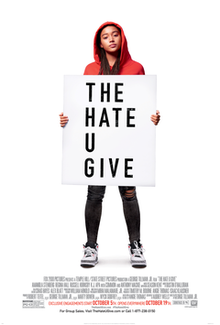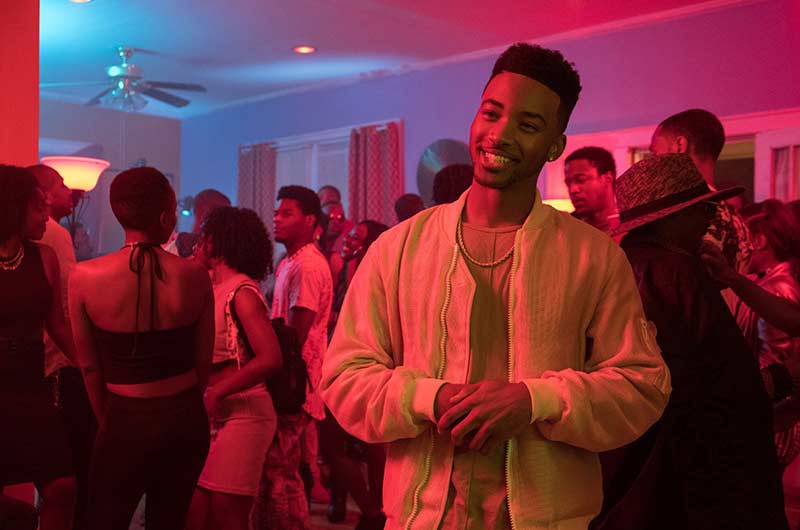← Back to Reviews
in
The Hate U Give
The 2018 drama The Hate U Give is an emotionally charged motion picture experience that made me so angry that I actually had to pause the movie and step away from it in an attempt to maintain my objectivity about what was unfolding before me as well as judging the film for its entertainment value and not allowing my personal feelings about the story to cloud my judgment.

Starr Carter is a 16 year old back girl who lives in a black neighborhood called Garden Heights but attends a predominately white high school where her mother has sent her and her half-brother because she feels the school in Garden Heights is too dangerous. One night she leaves a party in Garden Heights with a childhood friend she has just reconnected with. They are stopped by a cop because the guy forgot to signal when changing lanes, and when he reaches inside the car to get a hairbrush, the cop shoots and kills him, right in front of Starr.

The story begins to gather layers as it is revealed that Khalil, the young man who was shot, worked for the local drug kingpin, who also used to employ Starr's father. The community of Garden Heights is up in arms when all that happens to the cop is that he's put on paid administrative leave, awaiting a grand jury hearing. King, the drug kingpin, is afraid that Starr might say something to the police about what Khalil was doing and suddenly Starr finds herself in so much danger that her mother wants to move. On the other side of this intense racial coin, Starr does whatever she can to keep what has happened from her white friends while simultaneously appearing on television and telling everyone what happened that night (they blur her face on television), but her white boyfriend, Chris, figures out exactly what's going on on prom night.
:max_bytes(150000):strip_icc()/the-hate-u-give-7-2000-558fde7a2d4d4c848efcf5edf1bd62a1.jpg)
Audrey Wells screenplay, adapted from a novel by Angie Thomas, provides a story taut with racial tension that initially got me extremely angry. I think the last time a movie ignited such anger in me was 2013's Compliance, but, as a black man, it was very difficult to remain objective as I saw a white cop shoot and kill an unarmed black kid and receive not much more than a slap on the wrist for it. I was also angered by the fact that Starr was in danger because she really didn't do anything. Everyone in Garden Heights seemed to be aware that Khalil was working for King, but he was still in business, so why was he so threatened by Starr? On the other hand, it was hard to get behind Starr's belief that this cop should go to jail when she couldn't even be honest with all of her friends at the white high school about what had happened. And with her drastic change in behavior at school, why was no one but Chris able to figure out that Starr was the witness?

It's a messy and disturbing story that is told with surprising balance and director George Tillman Jr., whose resume prior to this film is less than impressive, is to be credited for the care and sensitivity he employed in the mounting of this story. Amandla Stenberg lights up the screen in an Oscar-worthy performance as Starr and I also loved Regina Hall as her mom and especially Russell Hornsby as her dad. The film features first rate production values and is perfectly framed by Dustin O'Halloran's music. A story of racial tension that definitely had my blood boiling.
The 2018 drama The Hate U Give is an emotionally charged motion picture experience that made me so angry that I actually had to pause the movie and step away from it in an attempt to maintain my objectivity about what was unfolding before me as well as judging the film for its entertainment value and not allowing my personal feelings about the story to cloud my judgment.

Starr Carter is a 16 year old back girl who lives in a black neighborhood called Garden Heights but attends a predominately white high school where her mother has sent her and her half-brother because she feels the school in Garden Heights is too dangerous. One night she leaves a party in Garden Heights with a childhood friend she has just reconnected with. They are stopped by a cop because the guy forgot to signal when changing lanes, and when he reaches inside the car to get a hairbrush, the cop shoots and kills him, right in front of Starr.

The story begins to gather layers as it is revealed that Khalil, the young man who was shot, worked for the local drug kingpin, who also used to employ Starr's father. The community of Garden Heights is up in arms when all that happens to the cop is that he's put on paid administrative leave, awaiting a grand jury hearing. King, the drug kingpin, is afraid that Starr might say something to the police about what Khalil was doing and suddenly Starr finds herself in so much danger that her mother wants to move. On the other side of this intense racial coin, Starr does whatever she can to keep what has happened from her white friends while simultaneously appearing on television and telling everyone what happened that night (they blur her face on television), but her white boyfriend, Chris, figures out exactly what's going on on prom night.
:max_bytes(150000):strip_icc()/the-hate-u-give-7-2000-558fde7a2d4d4c848efcf5edf1bd62a1.jpg)
Audrey Wells screenplay, adapted from a novel by Angie Thomas, provides a story taut with racial tension that initially got me extremely angry. I think the last time a movie ignited such anger in me was 2013's Compliance, but, as a black man, it was very difficult to remain objective as I saw a white cop shoot and kill an unarmed black kid and receive not much more than a slap on the wrist for it. I was also angered by the fact that Starr was in danger because she really didn't do anything. Everyone in Garden Heights seemed to be aware that Khalil was working for King, but he was still in business, so why was he so threatened by Starr? On the other hand, it was hard to get behind Starr's belief that this cop should go to jail when she couldn't even be honest with all of her friends at the white high school about what had happened. And with her drastic change in behavior at school, why was no one but Chris able to figure out that Starr was the witness?

It's a messy and disturbing story that is told with surprising balance and director George Tillman Jr., whose resume prior to this film is less than impressive, is to be credited for the care and sensitivity he employed in the mounting of this story. Amandla Stenberg lights up the screen in an Oscar-worthy performance as Starr and I also loved Regina Hall as her mom and especially Russell Hornsby as her dad. The film features first rate production values and is perfectly framed by Dustin O'Halloran's music. A story of racial tension that definitely had my blood boiling.
